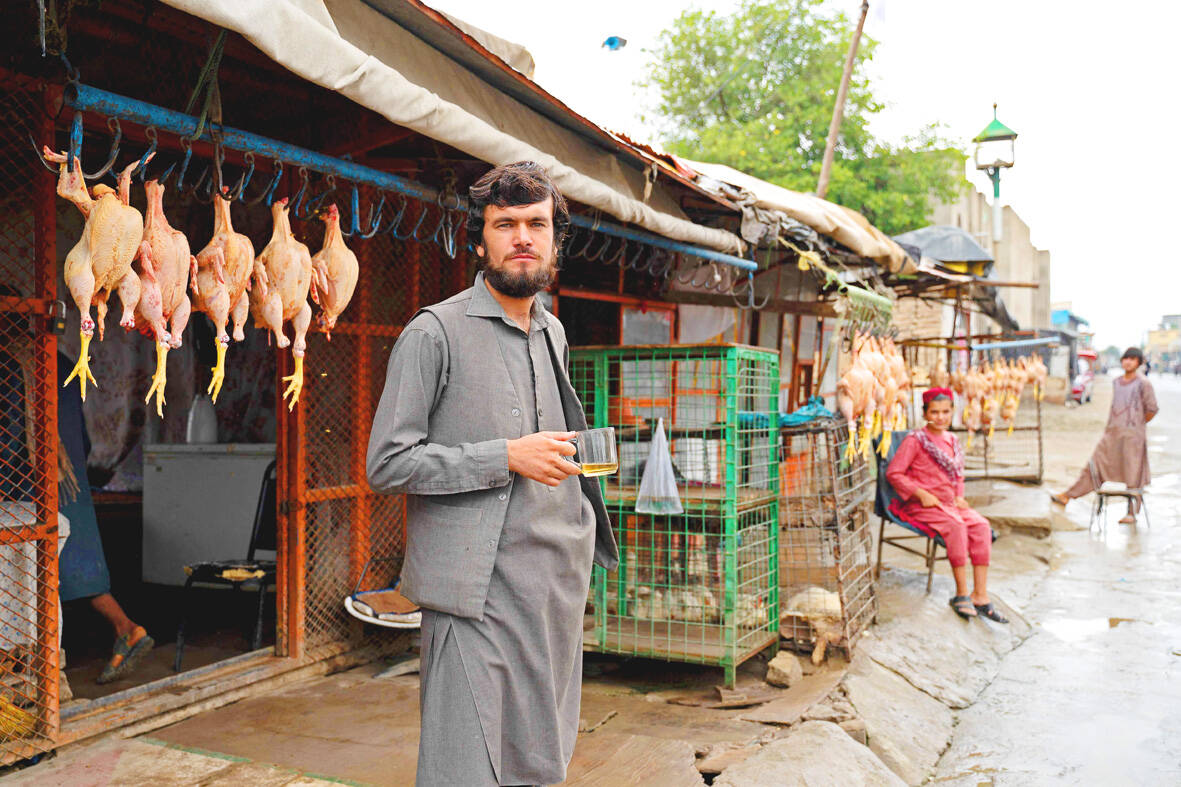For years, the sprawling military base at Bagram, just north of Kabul, was a potent symbol of the US’ two decades of war in Afghanistan.
The sprawling complex included an air base that was the linchpin of the US invasion, a prison where rights groups allege widespread abuses occurred, and a residential area that featured swimming pools, cinemas and spas.
Weeks before Washington officially ended its military presence in Afghanistan in August last year, US troops left the air base in the dead of night.

Photo: AFP
Today, the military base is occupied by the Taliban, who took over the country in a swift offensive as US forces were exiting.
The US departure from Bagram has also seen the collapse of the economy in the nearby town of the same name, an illustration of how Afghanistan’s fortunes were so heavily tied to the war and foreign aid.
“Today, I’m jobless. I don’t know much about politics, but the exit of US forces from the base is a big economic loss,” said Saifulrahman Faizi, one of the town’s 80,000 residents.
Faizi earned US$30 a day when he was employed at the base, when hundreds would line up for hours outside the compound in the hope of getting work.
“Now, nobody goes there. Everything has just crashed, everybody is struggling,” he said.
Nowhere is the town’s economic collapse more evident than in the main market.
It is marked by rows of shuttered shops and warehouses, and those that remain open have seen sales plummet.
Shah Wali, a 46-year-old grocery store keeper, said he used to earn an income of between 20,000 and 30,000 afghanis (US$226.51 and US$339.76). Today, he can barely pay his rent.
“With the Islamic Emirate [Taliban] coming to power, peace has returned, but business has gone,” Wali said, clutching his prayer beads.
At the peak of the US invasion, Bagram was home to tens of thousands of troops and contractors, with the town serving as a hub for tons of supplies that would service the base.
The airfield was first built by the US for their Afghan ally during the Cold War in the 1950s.
The Soviet Union vastly expanded it after invading Afghanistan in 1979.
After their withdrawal, the base was controlled by the Moscow-backed government, and later by the shaky mujahideen administration during the 1990s civil war.
With the Taliban seizing power last year, the airfield is under their control.
When the US military pulled out, it took much of its military hardware home, but a significant amount of civilian equipment was left behind.
For several months, the town managed to thrive on a booming scrap business, but residents say that, too, is dying.
Shops that sold used gym equipment, generators, air-conditioners and spare auto parts are either shut or receive few orders.
Several houses are deserted, their residents having moved to Kabul or elsewhere in search of work.
Many who had worked at the base have also fled the country, fearing reprisals from the Taliban.
“Half the people have gone, the town feels so empty,” Faizi said.

POLITICAL PRISONERS VS DEPORTEES: Venezuela’s prosecutor’s office slammed the call by El Salvador’s leader, accusing him of crimes against humanity Salvadoran President Nayib Bukele on Sunday proposed carrying out a prisoner swap with Venezuela, suggesting he would exchange Venezuelan deportees from the US his government has kept imprisoned for what he called “political prisoners” in Venezuela. In a post on X, directed at Venezuelan President Nicolas Maduro, Bukele listed off a number of family members of high-level opposition figures in Venezuela, journalists and activists detained during the South American government’s electoral crackdown last year. “The only reason they are imprisoned is for having opposed you and your electoral fraud,” he wrote to Maduro. “However, I want to propose a humanitarian agreement that

Young women standing idly around a park in Tokyo’s west suggest that a giant statue of Godzilla is not the only attraction for a record number of foreign tourists. Their faces lit by the cold glow of their phones, the women lining Okubo Park are evidence that sex tourism has developed as a dark flipside to the bustling Kabukicho nightlife district. Increasing numbers of foreign men are flocking to the area after seeing videos on social media. One of the women said that the area near Kabukicho, where Godzilla rumbles and belches smoke atop a cinema, has become a “real

‘POINT OF NO RETURN’: The Caribbean nation needs increased international funding and support for a multinational force to help police tackle expanding gang violence The top UN official in Haiti on Monday sounded an alarm to the UN Security Council that escalating gang violence is liable to lead the Caribbean nation to “a point of no return.” Special Representative of the UN Secretary-General for Haiti Maria Isabel Salvador said that “Haiti could face total chaos” without increased funding and support for the operation of the Kenya-led multinational force helping Haiti’s police to tackle the gangs’ expanding violence into areas beyond the capital, Port-Au-Prince. Most recently, gangs seized the city of Mirebalais in central Haiti, and during the attack more than 500 prisoners were freed, she said.

DEMONSTRATIONS: A protester said although she would normally sit back and wait for the next election, she cannot do it this time, adding that ‘we’ve lost too much already’ Thousands of protesters rallied on Saturday in New York, Washington and other cities across the US for a second major round of demonstrations against US President Donald Trump and his hard-line policies. In New York, people gathered outside the city’s main library carrying signs targeting the US president with slogans such as: “No Kings in America” and “Resist Tyranny.” Many took aim at Trump’s deportations of undocumented migrants, chanting: “No ICE [Immigration and Customs Enforcement], no fear, immigrants are welcome here.” In Washington, protesters voiced concern that Trump was threatening long-respected constitutional norms, including the right to due process. The